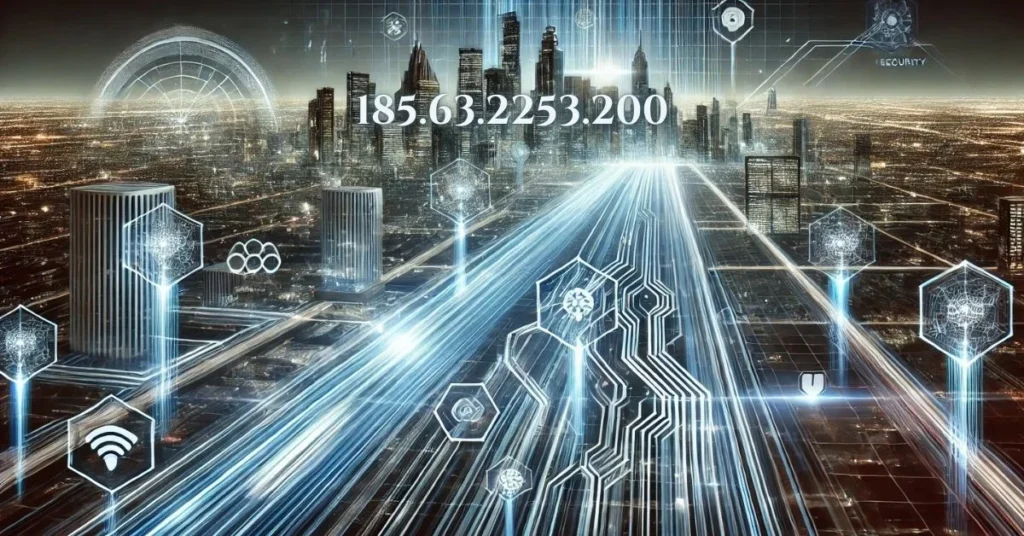In today’s hyper-connected world, the very backbone of our digital communication is powered by a complex yet fascinating web of IP addresses. One such intriguing entity, 185.63.2253.200, plays a critical role in ensuring that the data we depend on travels quickly, securely, and efficiently. Let’s dive deep into how this specific IP address is part of the greater digital orchestra that keeps our online lives running smoothly.
Introduction
Setting the Stage
Imagine the internet as a bustling metropolis. Every building represents a server, every street a connection, and every vehicle a data packet zipping from one point to another. Without clear routes and reliable addresses, chaos would ensue. This is where IP addresses come into play—they’re the street signs of our digital world.
The Role of IP Addresses in the Digital World
IP addresses are more than just numbers; they are the navigational coordinates that direct every piece of data across the internet. When you send an email, stream a video, or browse a website, an IP address is involved in making sure your request reaches the correct destination. Among these, 185.63.2253.200 serves as one of the many crucial nodes that keep our digital ecosystem vibrant and operational.
Understanding IP Addresses
What is an IP Address?
At its simplest, an IP (Internet Protocol) address is a unique identifier assigned to each device connected to a network. Think of it as a postal address for your computer or smartphone, ensuring that information is correctly delivered to you, not to someone else down the street.
The Evolution of IP Addressing
From the early days of the internet to the current era of high-speed connectivity, the concept of IP addressing has evolved dramatically. Early networks relied on simple addressing schemes that quickly became inadequate as the digital landscape expanded. Today, sophisticated systems are in place to manage billions of addresses.
Types of IP Addresses
IPv4 Explained
IPv4, or Internet Protocol version 4, has been the standard since the inception of the internet. It uses a 32-bit addressing system, allowing for approximately 4.3 billion unique addresses. While this was once more than sufficient, the explosive growth of internet-connected devices quickly pushed the limits of IPv4.
The Advent of IPv6
To accommodate our ever-growing digital universe, IPv6 was introduced. With a 128-bit addressing scheme, IPv6 offers a virtually limitless number of unique addresses. This transition ensures that innovations and new devices can continue to join the network without encountering bottlenecks.
Decoding 185.63.2253.200
Unique Attributes of 185.63.2253.200
While 185.63.2253.200 might look like just another string of numbers, it embodies several key attributes that make it integral to modern internet connectivity. Its structure and allocation are carefully designed to optimize routing efficiency and enhance network security.
Common Misconceptions and Clarifications
There are many myths surrounding IP addresses, particularly unique ones like 185.63.2253.200. Some believe that each IP address represents a physical location or a specific piece of hardware, but in reality, IP addresses are dynamic and can be reassigned as needed. This flexibility is essential for maintaining a resilient and adaptable network infrastructure.
The Backbone of Internet Connectivity
Data Routing and Packet Switching
Data travels over the internet in small units called packets. Each packet is routed independently based on its destination IP address. With systems like 185.63.2253.200 in place, these packets find the most efficient paths through a labyrinth of networks. This is akin to how modern GPS systems chart the fastest route through busy city streets.
Domain Name System (DNS) and IP Resolution
When you type a website address into your browser, the Domain Name System (DNS) translates that human-friendly URL into an IP address. This conversion is crucial because while we might remember names like “google.com,” the underlying communication relies on numerical IP addresses like 185.63.2253.200 to locate and connect to servers across the globe.
How 185.63.2253.200 Enhances Connectivity
Speed and Reliability
Speed is the lifeblood of the modern internet, and 185.63.2253.200 contributes significantly to reducing latency—the delay before a transfer of data begins following an instruction. With optimized routing and minimal packet loss, this IP address helps ensure that your online experiences, from video calls to gaming, are as smooth as possible.
Ensuring Robust Security
Security is another critical facet of internet connectivity. With cyber threats evolving rapidly, systems behind IP addresses such as 185.63.2253.200 are equipped with advanced protocols to detect and mitigate potential breaches. Think of it as a high-tech security system guarding the entrance to a digital fortress, keeping out unwanted intruders while ensuring seamless access for legitimate users.
Technical Infrastructure Behind IP Addresses
Servers and Data Centers
Servers and data centers are the physical backbone of internet connectivity. They host websites, store vast amounts of data, and run complex applications that we use daily. IP addresses like 185.63.2253.200 are integral to the functioning of these data centers, ensuring that data is correctly routed and processed. The interplay between hardware and IP addressing systems creates a robust framework that supports global communication.
Network Protocols and Standards
Network protocols such as TCP/IP (Transmission Control Protocol/Internet Protocol) serve as the foundational rules for data exchange over the internet. These protocols ensure that devices can communicate with each other seamlessly, regardless of the underlying hardware differences. 185.63.2253.200 is part of this standardized system, which has been refined over decades to handle increasing volumes of traffic and complexity.
The Evolution of Internet Connectivity
Past Developments
The journey of internet connectivity is a tale of innovation and adaptation. From the initial ARPANET experiments in the late 1960s to today’s high-speed broadband networks, every step has been marked by groundbreaking advancements. Early networks were limited by the technology of the time, but as demands grew, so did the complexity and efficiency of the systems we use now.
Emerging Trends and Future Prospects
Looking ahead, the future of internet connectivity is bright. With the advent of 5G, enhanced fiber-optic networks, and further developments in IPv6, our online experiences are set to become even more immersive and reliable. IP addresses like 185.63.2253.200 will continue to evolve, adapting to new technologies and playing a pivotal role in shaping the digital frontier.
Real-World Applications
Business and Enterprise Solutions
Businesses rely heavily on stable internet connections to operate efficiently. From cloud computing to online transactions, the role of IP addresses in ensuring smooth connectivity cannot be overstated. Enterprises utilize dedicated IP addresses to manage internal communications, secure data transfers, and support remote work infrastructures—all contributing to a robust digital ecosystem.
Home Networking and IoT Integration
In today’s smart homes, the Internet of Things (IoT) connects everyday devices like refrigerators, thermostats, and security cameras. These devices communicate using IP addresses, ensuring that your home is not only smart but also secure. The seamless integration provided by systems including 185.63.2253.200 guarantees that your digital life at home is efficient, interconnected, and responsive.
Challenges and Limitations
Scalability and Network Management
As the number of connected devices continues to soar, scalability becomes a significant challenge. Managing an ever-growing pool of IP addresses while ensuring efficient routing and minimal latency is no small feat. Network administrators must constantly innovate and implement smart solutions to overcome these hurdles without compromising performance.
Security Threats and Mitigation Strategies
While IP addresses like 185.63.2253.200 are designed to enhance connectivity, they can also be targets for malicious activities. Cybercriminals often exploit vulnerabilities in network protocols, which makes continuous monitoring and the implementation of robust security measures essential. From firewalls to advanced encryption, safeguarding the network is an ongoing battle in the digital age.
Case Studies and Success Stories
Industry-Leading Examples
Several industry leaders have harnessed the power of efficient IP addressing to transform their operations. For instance, global tech companies have optimized their networks to support millions of simultaneous users without a hitch. These success stories highlight how well-managed IP systems contribute to smoother operations, enhanced user experiences, and even significant cost savings.
Lessons from the Field
Real-world applications of IP connectivity offer invaluable lessons. Businesses that invest in robust network infrastructures often see marked improvements in performance and reliability. These lessons are not just technical; they are strategic, influencing how companies plan for future growth and handle cybersecurity challenges. Each success story underscores the importance of continuous innovation in IP management.
The Role of Innovation in Internet Connectivity
Technological Advancements
Innovation is the engine that drives internet connectivity forward. New technologies are constantly emerging to tackle the increasing demands of a connected world. From AI-driven network management tools to advanced encryption techniques, the technology behind IP addresses is ever-evolving. These advancements ensure that even as the internet expands, our ability to manage and secure it keeps pace.
Future Innovations on the Horizon
What does the future hold? Experts predict a wave of innovations that will further streamline how IP addresses function. The integration of quantum computing, machine learning, and even more sophisticated algorithms may soon redefine network management. With these innovations, IP addresses like 185.63.2253.200 will be at the heart of an increasingly intelligent and adaptive internet.
Practical Tips for Leveraging IP Connectivity
Optimizing Network Performance
For those managing networks—be it a small business or a large enterprise—optimizing performance is crucial. Regular maintenance, firmware updates, and network audits help ensure that IP addresses work efficiently. Simple tips such as optimizing routing protocols, using quality hardware, and regularly monitoring network traffic can make a significant difference in overall performance.
Best Practices for Secure Connections
Security should never be an afterthought. To safeguard your network, adopt a multi-layered approach: utilize strong firewalls, enforce secure passwords, and invest in regular cybersecurity training. Staying updated with the latest security patches and employing encryption protocols not only protects data but also reinforces the trust your users place in your digital infrastructure.
The Global Impact of IP-Driven Connectivity
Bridging the Digital Divide
IP connectivity is a crucial factor in bridging the digital divide between different regions of the world. By enabling efficient data transmission, reliable IP systems empower remote communities, making education, healthcare, and economic opportunities more accessible. In many ways, a single IP address can represent hope for a more connected, equitable future.
Economic and Social Implications
The impact of efficient IP addressing transcends technology—it has profound economic and social implications. Enhanced connectivity drives innovation, boosts commerce, and fosters community engagement. As businesses and individuals leverage faster, more reliable networks, the ripple effects contribute to global economic growth and improved quality of life.
Conclusion
In wrapping up our deep dive into 185.63.2253.200 and its role in powering internet connectivity, we’ve seen how a simple string of numbers can embody the intricate, powerful mechanisms that keep our digital world alive. From routing data packets at lightning speed to safeguarding sensitive information, this IP address is a microcosm of the vast and dynamic network infrastructure that defines our online experiences. Whether you’re a tech enthusiast, a network administrator, or just a curious internet user, understanding the nuances behind these digital building blocks can offer a whole new perspective on the invisible threads connecting us all.
By continuously evolving and adapting, the world of IP addresses remains at the forefront of technological innovation. With challenges like scalability and security keeping the pressure on, the future promises even more exciting developments that will further transform how we connect, communicate, and collaborate online.
FAQs
What exactly is an IP address, and why is it so important?
An IP address is a unique numerical label assigned to devices connected to a network. It functions like a digital mailing address, ensuring that data packets find the correct destination, thereby enabling seamless communication across the internet.
How does an IP address like 185.63.2253.200 contribute to network security?
IP addresses play a vital role in network security by allowing systems to monitor data traffic, detect potential threats, and implement robust security protocols. They help in identifying and mitigating cyber threats before they compromise sensitive information.
Are there differences between IPv4 and IPv6, and which one is more relevant today?
Yes, IPv4 uses a 32-bit addressing system, while IPv6 uses a 128-bit system, offering far more unique addresses. With the increasing number of devices online, IPv6 is becoming more relevant, ensuring that every connected device can have its own unique identifier.
How do IP addresses facilitate faster internet speeds?
Efficient routing protocols and optimized network management allow data packets to travel the fastest and most reliable paths. This minimizes latency and packet loss, ensuring high-speed internet connectivity even during peak usage times.
What can we expect for the future of IP connectivity?
The future of IP connectivity looks promising with innovations like 5G, quantum computing, and machine learning-based network management. These advancements are expected to further enhance speed, security, and overall network performance, making digital interactions smoother and more efficient.






